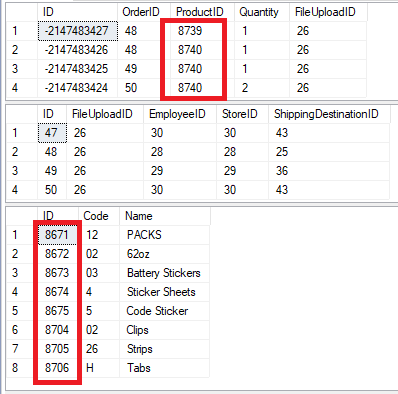SQL Server 2016 here...I'm wanting to return all rows from my products table, then return only the info that meets the where criteria. Currently, I am only getting data returned where the count >= 1 so if an item exists in my product table but nothing was ordered that product is not being returned.
Below is DDL
SET ANSI_NULLS ON
GO
SET QUOTED_IDENTIFIER ON
GO
CREATE TABLE [dbo].[OrderItems](
[ID] [int] IDENTITY(-2147483648,1) NOT NULL,
[OrderID] [int] NOT NULL,
[ProductID] [int] NOT NULL,
[Quantity] [int] NOT NULL,
[FileUploadID] [int] NOT NULL,
CONSTRAINT [PK_OrderItems] PRIMARY KEY CLUSTERED
(
[ID] ASC
)WITH (PAD_INDEX = OFF, STATISTICS_NORECOMPUTE = OFF, IGNORE_DUP_KEY = OFF, ALLOW_ROW_LOCKS = ON, ALLOW_PAGE_LOCKS = ON) ON [PRIMARY]
) ON [PRIMARY]
GO
/****** Object: Table [dbo].[Orders] Script Date: 5/10/2021 6:46:16 PM ******/
SET ANSI_NULLS ON
GO
SET QUOTED_IDENTIFIER ON
GO
CREATE TABLE [dbo].[Orders](
[ID] [int] IDENTITY(1,1) NOT NULL,
[FileUploadID] [int] NOT NULL,
[EmployeeID] [int] NOT NULL,
[StoreID] [int] NOT NULL,
[ShippingDestinationID] [int] NOT NULL,
CONSTRAINT [PK_Orders] PRIMARY KEY CLUSTERED
(
[ID] ASC
)WITH (PAD_INDEX = OFF, STATISTICS_NORECOMPUTE = OFF, IGNORE_DUP_KEY = OFF, ALLOW_ROW_LOCKS = ON, ALLOW_PAGE_LOCKS = ON) ON [PRIMARY]
) ON [PRIMARY]
GO
/****** Object: Table [dbo].[Products] Script Date: 5/10/2021 6:46:16 PM ******/
SET ANSI_NULLS ON
GO
SET QUOTED_IDENTIFIER ON
GO
CREATE TABLE [dbo].[Products](
[ID] [int] IDENTITY(1,1) NOT NULL,
[Code] nvarchar NOT NULL,
[Name] nvarchar NOT NULL,
CONSTRAINT [PK_Products] PRIMARY KEY CLUSTERED
(
[ID] ASC
)WITH (PAD_INDEX = OFF, STATISTICS_NORECOMPUTE = OFF, IGNORE_DUP_KEY = OFF, ALLOW_ROW_LOCKS = ON, ALLOW_PAGE_LOCKS = ON) ON [PRIMARY]
) ON [PRIMARY]
GO
SET IDENTITY_INSERT [dbo].[OrderItems] ON
GO
INSERT [dbo].[OrderItems] ([ID], [OrderID], [ProductID], [Quantity], [FileUploadID]) VALUES (-2147483427, 48, 8739, 1, 26)
GO
INSERT [dbo].[OrderItems] ([ID], [OrderID], [ProductID], [Quantity], [FileUploadID]) VALUES (-2147483426, 48, 8740, 1, 26)
GO
INSERT [dbo].[OrderItems] ([ID], [OrderID], [ProductID], [Quantity], [FileUploadID]) VALUES (-2147483425, 49, 8740, 1, 26)
GO
INSERT [dbo].[OrderItems] ([ID], [OrderID], [ProductID], [Quantity], [FileUploadID]) VALUES (-2147483424, 50, 8740, 2, 26)
GO
SET IDENTITY_INSERT [dbo].[OrderItems] OFF
GO
SET IDENTITY_INSERT [dbo].[Orders] ON
GO
INSERT [dbo].[Orders] ([ID], [FileUploadID], [EmployeeID], [StoreID], [ShippingDestinationID]) VALUES (47, 26, 30, 30, 43)
GO
INSERT [dbo].[Orders] ([ID], [FileUploadID], [EmployeeID], [StoreID], [ShippingDestinationID]) VALUES (48, 26, 28, 28, 25)
GO
INSERT [dbo].[Orders] ([ID], [FileUploadID], [EmployeeID], [StoreID], [ShippingDestinationID]) VALUES (49, 26, 29, 29, 36)
GO
INSERT [dbo].[Orders] ([ID], [FileUploadID], [EmployeeID], [StoreID], [ShippingDestinationID]) VALUES (50, 26, 30, 30, 43)
GO
SET IDENTITY_INSERT [dbo].[Orders] OFF
GO
SET IDENTITY_INSERT [dbo].[Products] ON
GO
INSERT [dbo].[Products] ([ID], [Code], [Name]) VALUES (8671, N'12 PACKS')
GO
INSERT [dbo].[Products] ([ID], [Code], [Name]) VALUES (8672, N'02', N'62oz')
GO
INSERT [dbo].[Products] ([ID], [Code], [Name]) VALUES (8673, N'03', N'Battery Stickers')
GO
INSERT [dbo].[Products] ([ID], [Code], [Name]) VALUES (8674, N'4', N'Sticker Sheets')
GO
INSERT [dbo].[Products] ([ID], [Code], [Name]) VALUES (8675, N'5', N'Code Sticker')
GO
INSERT [dbo].[Products] ([ID], [Code], [Name]) VALUES (8704, N'02', N'Clips')
GO
INSERT [dbo].[Products] ([ID], [Code], [Name]) VALUES (8705, N'26', N'Strips')
GO
INSERT [dbo].[Products] ([ID], [Code], [Name]) VALUES (8706, N'H', N'Tabs')
GO
GO
SET IDENTITY_INSERT [dbo].[Products] OFF
GO
ALTER TABLE [dbo].[OrderItems] WITH NOCHECK ADD CONSTRAINT [FK_OrderItems_FileUploads] FOREIGN KEY([FileUploadID])
REFERENCES [dbo].[FileUploads] ([ID])
GO
ALTER TABLE [dbo].[OrderItems] CHECK CONSTRAINT [FK_OrderItems_FileUploads]
GO
ALTER TABLE [dbo].[OrderItems] WITH NOCHECK ADD CONSTRAINT [FK_OrderItems_Orders] FOREIGN KEY([OrderID])
REFERENCES [dbo].[Orders] ([ID])
GO
ALTER TABLE [dbo].[OrderItems] CHECK CONSTRAINT [FK_OrderItems_Orders]
GO
ALTER TABLE [dbo].[OrderItems] WITH NOCHECK ADD CONSTRAINT [FK_OrderItems_Products] FOREIGN KEY([ProductID])
REFERENCES [dbo].[Products] ([ID])
ON DELETE CASCADE
GO
ALTER TABLE [dbo].[OrderItems] CHECK CONSTRAINT [FK_OrderItems_Products]
GO
ALTER TABLE [dbo].[Orders] WITH NOCHECK ADD CONSTRAINT [FK_Orders_Employees] FOREIGN KEY([EmployeeID])
REFERENCES [dbo].[Employees] ([ID])
GO
ALTER TABLE [dbo].[Orders] CHECK CONSTRAINT [FK_Orders_Employees]
GO
ALTER TABLE [dbo].[Orders] WITH NOCHECK ADD CONSTRAINT [FK_Orders_FileUploads] FOREIGN KEY([FileUploadID])
REFERENCES [dbo].[FileUploads] ([ID])
GO
ALTER TABLE [dbo].[Orders] CHECK CONSTRAINT [FK_Orders_FileUploads]
GO
ALTER TABLE [dbo].[Orders] WITH NOCHECK ADD CONSTRAINT [FK_Orders_ShippingDestinations] FOREIGN KEY([ShippingDestinationID])
REFERENCES [dbo].[ShippingDestinations] ([ID])
GO
ALTER TABLE [dbo].[Orders] CHECK CONSTRAINT [FK_Orders_ShippingDestinations]
GO
ALTER TABLE [dbo].[Orders] WITH NOCHECK ADD CONSTRAINT [FK_Orders_Stores] FOREIGN KEY([StoreID])
REFERENCES [dbo].[Stores] ([ID])
GO
ALTER TABLE [dbo].[Orders] CHECK CONSTRAINT [FK_Orders_Stores]
GO
I tried the query ->
SELECT
p.[ID],
p.[Code],
p.[Name],
oi.FileUploadID
FROM Products p
LEFT join OrderItems oi
on oi.ProductID = p.id
LEFT JOIN Orders o
ON o.ID = oi.OrderID
AND o.FileUploadID = oi.FileUploadID
WHERE o.FileUploadID = 26
I was thinking since I selected from product first then did left joins on all the tables it would do that, but no luck.

